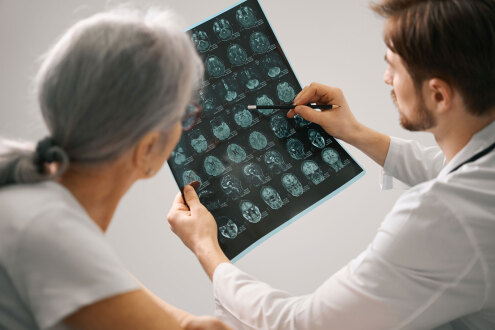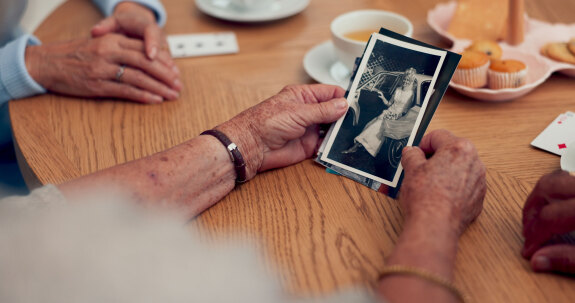Topic page: Dementia

© Envato.com
What does the diagnosis mean for those affected and their relatives?More and more people are suffering from dementia in old age. In Bocholt, there is special help for those affected and their relatives.
Dementia - what is it?
In 2024, around 1.8 million people in Germany were suffering from dementia. Over 300,000 new cases are added every year.
Recognising the first signs
Dementia begins gradually, almost imperceptibly and many people hardly notice it at first. Symptoms and the different types of dementia are often not recognised.
The best-known types of dementia are diseases that develop directly in the nerve cells or their immediate blood supply. The damage to the brain can be caused by a sudden traumatic event such as a respiratory or cardiac arrest or a head injury. Or it can be the result of longer-lasting change processes, e.g. due to diseases of the nerve cells or disruption of the blood supply.
The most common forms of dementia are
Alzheimer's disease
is the most common form of dementia: almost two thirds of all dementia sufferers are affected by this diagnosis. Alzheimer's is a slowly progressive disease. The areas of the brain that are affected are those that are important for thinking, language and the ability to orientate oneself.
Vascular dementia
is the second most common form of dementia. It usually occurs as a result of circulatory disorders caused by small and often unnoticed strokes. The symptoms can occur suddenly or gradually. Similar to Alzheimer's dementia, there is a loss of mental capacity and often depressive moods.
Frontotemporal dementia
is a rather rare form of dementia. In this case, the focus is not so much on memory loss and impaired mental performance, but on changes in personality and behaviour. Living with a person with frontotemporal dementia can be a great challenge and an enormous burden for relatives.
People affected by Lewy body dementia
often suffer from visual hallucinations even in the early stages. There are significant fluctuations in attention. Motor function disorders can occur that are reminiscent of Parkinson's disease.
First signs
Not every impairment of mental capacity is a sign of the onset of dementia. However, it is important to clarify early and professionally what triggers the forgetfulness in order to treat possible causes or, in the case of Alzheimer's disease, to start therapy at an early stage.
On the one hand, memory problems can have causes that are easy to treat; on the other hand, medication that can delay the progression of Alzheimer's disease is most effective at the onset of the disease.
If you experience the following symptoms and warning signs, you should consult a doctor to clarify the causes:
- Forgetting recent events
- Difficulty carrying out familiar activities
- Loss of interest in work, hobbies and socialising
- Difficulty finding your way in unfamiliar or familiar surroundings
- Problems with language
- Loss of overview of financial matters
- Misjudgement of dangers
- Unprecedented mood swings
- persistent anxiety, irritability and mistrust.
The first point of contact for clarifying the above symptoms is the family doctor, who may then refer the patient to a specialist, neurologist or psychiatrist, or to a memory consultation. Memory consultations, also known as memory clinics, are departments attached to hospitals that specialise in brain disorders.
Here are two links to the clinics in Essen and Münster:
Further information
What help is available in Bocholt for those affected and their relatives?
Dementia Network Bocholt
People with dementia and their relatives need special help and support. This includes qualifying specialist staff, supporting relatives in their care and support, recruiting and empowering volunteers, creating social networks and expanding and bundling care services. The Dementia Network in Bocholt has set itself this task. The Dementia Network was founded at the end of 2008 on the initiative of the Senior Citizens' Office. The Senior Citizens' Office is the office of the Bocholt Dementia Network.
Members of the Dementia Network Bocholt
AOK NordWest - Care counselling
AWO care service & social centre
Azurit living with service at the city forest
Caritas Education Centre for Care and Health Rhede/Borken
Caritas Association for the Deanery Bocholt e.V. - Senior citizens and dementia counselling
Deaconry Bocholt - Protestant Johanneswerk
DRK nursing service & social centre
DRK nursing school in the Borken district
DRK Senior Citizens' Meeting Centre
Marriage, family and life counselling
Contact office for care self-help - Alzheimer NRW
Regional office for old age, care and dementia
Rothkirch Senior Citizens Services
Schanze Senior Citizens' Residence
St. Agnes Hospital Social Services & Care Transfer
Day care at Käthe-Kollwitz-Haus
Dementia rucksack
Would you like to find out more about dementia? Are you looking for testimonials from those affected or family carers, guides, children's books or films on the subject? Or old photos of Bocholt that activate memories in people with dementia? Do you need addresses of contact centres and offers of help in Bocholt?
Then the dementia rucksack offers you the opportunity to do so with a wealth of materials.
The initiative to make such a rucksack available to the Bocholt population came from the Bocholt Senior Citizens' Advisory Council. The project was then realised in cooperation with the Bocholt City Library, the Bocholt Senior Citizens' Office and the Bocholt Dementia Network. The aim of the dementia rucksack is to provide people with dementia and their relatives with information that helps them to cope better with their new life situation.
The rucksack can be borrowed free of charge from the city library for 4 weeks. You do not have to be a member of the library, but please bring your identity card with you.
"Everyday companions for people with dementia"
Qualified support for people with dementia - strengthening and relieving family members
The basic qualification is aimed at family carers and people who would like to work as dementia carers in Bocholt.
The 40 teaching hours are held over 7 evening events and 2 half-day events (Saturdays). At the end of the course, participants receive a certificate in accordance with § 45 SGB XI for the additional care and respite services.
The cost contribution is €50.00 per participant. One basic qualification takes place every six months, there is a list of interested parties.
The course is subsidised by AOK NordWest.
If you are interested, please contact the city of Bocholt's senior citizens' office.
Become a "DEMENZ PARTNER.in"
The two-hour compact course "DEMENZ PARTNER.in" trains family carers and volunteers in dealing with dementia. Participants learn more about the limitations associated with this illness and how those affected and their relatives can be supported. Participants receive a certificate at the end of the course.
Date: 10 October 2025 2 pm - 4 pm, L-i-A, Wesemannstraße 19, 46397 Bocholt
Registration by telephone:
Caritasverband Bocholt e.V., Sandra Wölker, Tel. 02871 - 2513 1205
Association Leben im Alter e.V., Irma Sondermann, Tel. 02871 - 217 6566



